12 Steps to Create Social Media Marketing Strategy Plan in 2024

Summary: Multiple social media sites like Instagram, Facebook, or Tik Tok have become popular mediums to promote products and services. But how to beat the competition and make your mark? Here’re a few tips to creating effective social media strategies.
Simply, posting your content on social media is not enough to improve brand visibility and boost sales. Businesses need to formulate an effective social media marketing strategy to gain a competitive edge and reach out to wider audiences.
In simple terms, the strategy will provide you with guidance and outline the roadmap that would help in achieving your social media goals.
From optimizing the content to running ads, the right plan would help in maximizing engagement and interactions with your social media handles. What else can you achieve with a social media plan? Find out in the article below.
What is Social Media Marketing Strategy?
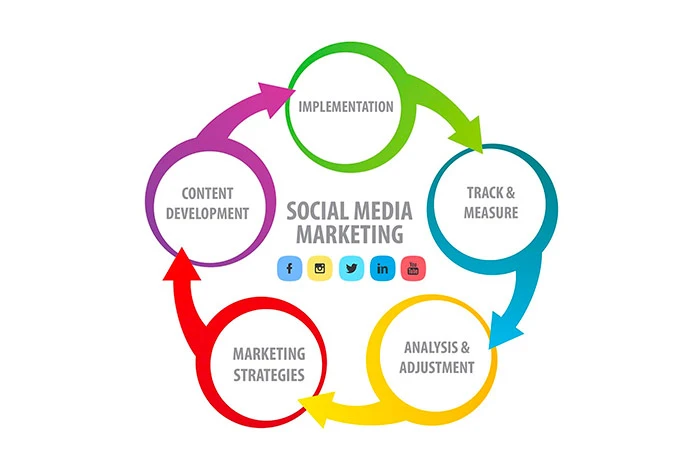
Social Media Marketing Strategy maps out all the social media marketing goals, strategies to achieve them, and necessary metrics to track the performance against predefined goals. You can also define the roles and responsibilities for the effective implementation of the social media marketing strategies.
Steps to Create Social Media Marketing Strategy for Business
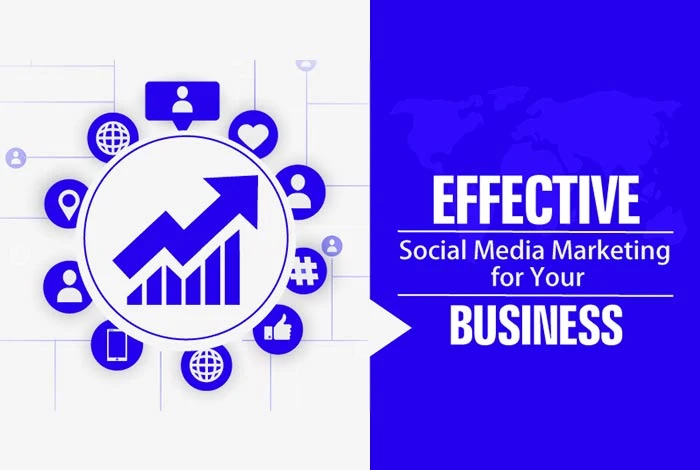
To create an effective social media marketing strategy, follow the below steps:
- Set the Goals and Metrics Specific to Your Business
Setting your goals is crucial to creating and implementing online social media marketing strategies. Each of the goals should be measurable, receivable, specific, and time bound. Rather than focusing on vague metrics, you must focus on those KPIs that better align with social media marketing strategy goals. Some of these metrics include:
- Reach: Reach is the number of times users saw your post. Analyzing it would tell you how far your content has reached in terms of audience.
- Clicks: You need to track the number of clicks per social media marketing campaign to understand what makes the customers buy the product or visit the website.
- Engagement: Divide the total number of social interactions by the no. of impressions of each post. This data will tell you how your audience think of your brand and how well they interact with your website.
- Organic and Paid Likes: Many brands turn to paid ads when they are unable to get organic engagement for their website. Learning the differences between these two could help you budget the amount you want to spend on and the time you need to invest in them.
- Hashtags Performance: Check the most performing hashtags relevant to your industry to insert them into your content for better reach and engagement.
You need to analyze all these metrics to learn about the effectiveness of the current online social media marketing strategy.
Example: If you use LinkedIn for driving traffic to your website, you can check for click through rates. If you are using Instagram to improve your brand awareness, then you can track the number of views on Instagram stories. Therefore, you need to set specific goals to achieve specific results for different social media channels.
- Find and Analyze Your Target Audience
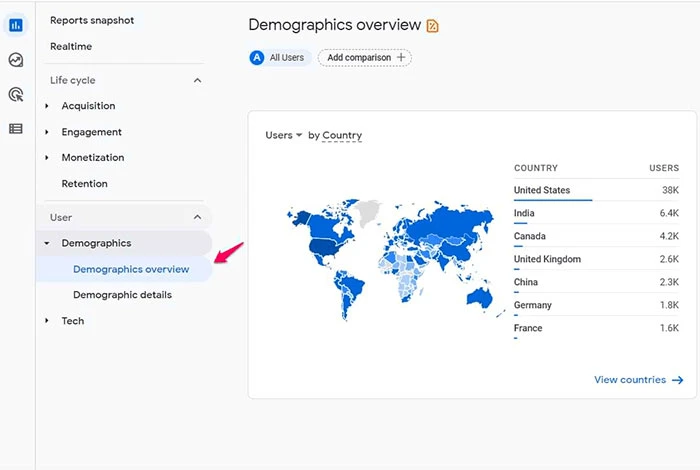
Know everything about your target audience to attract them and address their needs. By studying demographic details like age, location, typical job title or industry, interests, etc., you can learn how your audience interact with your brand on social media.
With social media analytics, you can study all your audience data and find the platform on which your target audience is most active. All this data would help in finding the relevant social media site where the audience is most active and create strategies accordingly.
Example: Jugnoo, an Uber-like service, used Facebook Analytics and found out that 90% of the customers that referred other customers were aged between 18- and 34-years Also, 65% of the user group were Android users. This information helped them to create audience-targeted ads and drive better results.
- Learn About Your Competitors
By performing competitive analysis, you can find who your competitors are, what they are doing on social media, and who are their active customers. This will help you in coming up with an effective social media campaign and targeting your audience.
Some of your competitors might not have a significant presence on Reddit or Pinterest. Hence, you can grab the opportunity to improve your presence on these platforms and outperform your competitors.
Further, you can also view and analyze your competitor’s social media handles to find the hashtags they are using, content they are sharing, etc. You can also find how the audience is interacting with their content.
Pro tip: You can use Hootsuite Streams, SEMrush, SpyFu, Owletter, and SimilarWeb to find relevant keywords, hashtags, and accounts specific to your business.
- Create Accounts and Improve Your Profiles
Once you decide which social media platform you want to focus on, you need to create an account. The choice for the best platform would depend on your business type.
For example, if your company deals with cosmetics, you can choose Instagram or Facebook to upload makeup tutorials, updates about new products, etc. Once selected the platform, create your business account on the required social media platform.
While creating your profile, ensure that it includes business specific keywords and a consistent logo or pictures that makes your profile recognizable among the competitors.
Pro-tip: Write down a mission statement for your account to highlight the goal of using the social media site.
Suggested Read: Paid vs. Organic Social Media Strategy: A Complete Guide
- Create a Social Media Content Calendar
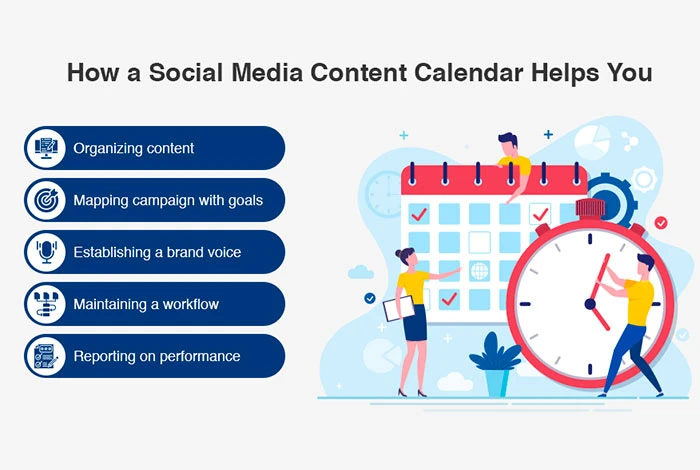
Posting the content at regular intervals is important to get the maximum impact. With a content scheduler, you can schedule the date and number of times your content would be published on your social media handles. Further, it will also identify the most relevant time to post content. You need to determine the right mix of the content types to support your online social media marketing strategies.
For example, you can create some content to drive back website traffic, some for generating leads, and some to promote your brand. If you are creating content from scratch, you can publish 80% of the content to educate and entertain your audience and 20% to promote the brand.
Pro-tip: With Hootsuite, Sendible, Loomly, Iconosquare, etc., plan the entire content calendar and get recommendations for the best time to post on various networks.
- Create Crisp and Engaging Content for Social Media
Creating engaging content for your social media is one of the most important aspects of your social media marketing plan to earn more followers and improve visibility. It can be in multiple forms such as short posts, blogs, videos, short videos, etc.
Further, creating content with the brand’s hashtags could help your brand get noticed and encourage audience to share content on other social media platforms.
Adopting a unique and distinctive brand tone suitable for your brand would help you to build strong relationships with your customers. One thing you need to keep in mind is that the content should be relevant to the purpose you want to achieve on each social media network.
Pro-Tip: Do a competitor analysis to formulate engaging content relevant to your business or industry. You can use tools like Quick Search, BuiltWith, WooRank, etc., for this purpose.
- Ensure Consistent Presence Across the Social Media Platforms
It is important to be consistent on social media to stay connected with the target audience. Most content calendar tools come with advanced analytics to suggest the best time to publish content for better customer engagement.
Further, you can automate replies for most of your customer’s questions or queries to be constantly available for them even when offline. This is important because late replies to customers’ questions or queries might make them shift to your competitors or they might not complete the purchase order.
Example: If your business deals with cosmetics and skincare, you can post, and schedule related to skincare to boost the customer’s experience. Post videos related to makeup tutorials, or how to do skincare with your products, etc.
- Analyze and Improve the Social Media Marketing Plan with Auditing

After implementing the social media strategy, you need to measure its effectiveness and adjust the current strategy. Conducting the social media auditing will highlight what’s working, engagement with content, social media handles used by target audience, etc. Once you do that, you can formulate strategies to improve the social media presence.
This auditing will also make it clear which social media handle works best for your business and which is not. Further, you can find all the imposter’s’ accounts that might be harming your credibility with your customers.
Hence, constantly monitoring your growth is prerequisite to be constantly in front of the target audience. Further, generating social media reports would help you to measure the effectiveness of social media campaigns with the set KPIs. Some of the metrics you can consider are engagement rate, post clicks and views, hashtags performance, etc.
Example: If you are running a marketing campaign, you can analyze it against different metrics like the most performing hashtags, click rates on posts, post impressions, etc. Analyzing the campaign against these metrics would help you make necessary changes to the existing marketing strategies.
Examples of Social Media Strategy Templates
Here are some examples of social media strategies templates that you can consider for your business.
- Setting Goals for Social Media Marketing Plan
This template highlights all the goals you need to achieve through your social media marketing plan.
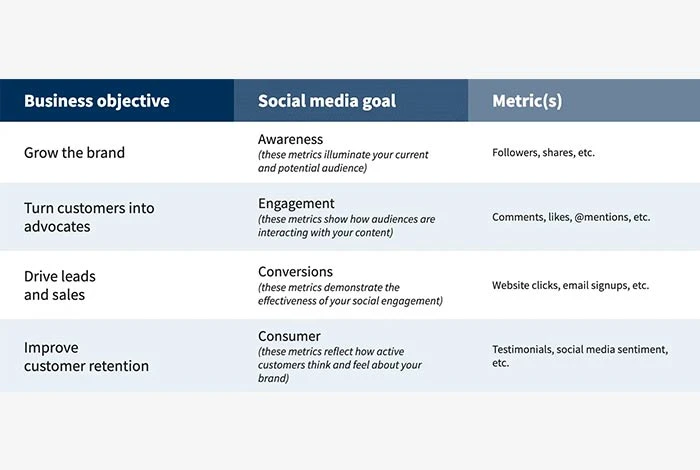
- Social Media Content Calendar
It is a content calendar that you can use to schedule content on hourly, weekly, or monthly basis hassle-free.

- Social Media Audit Template
Perform social media auditing for multiple platforms to learn what is working for your brand.

Suggested Read: Buffer vs. Hootsuite: Which Tool for Social Media Management Tool is Best?
- Competitive Analysis for Social Media Marketing
Performing competitive analysis would help you to find loopholes in your own social media plan and formulate new strategies to overcome them.
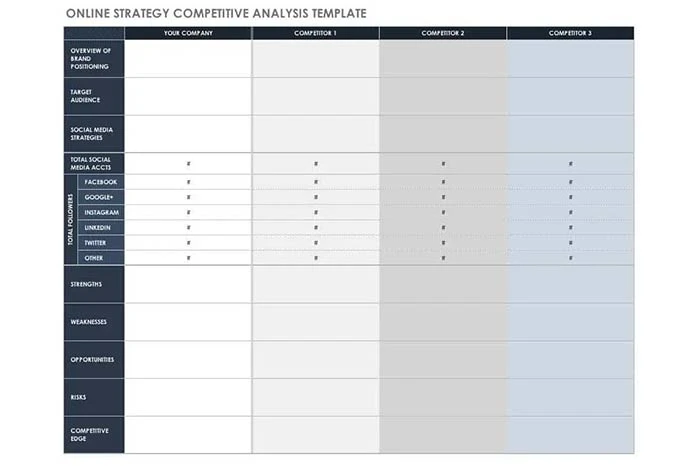
- Engagement Rate Calculator
Using an engagement rate calculator would help in finding how your audience engage with your brand and which post is performing the most.
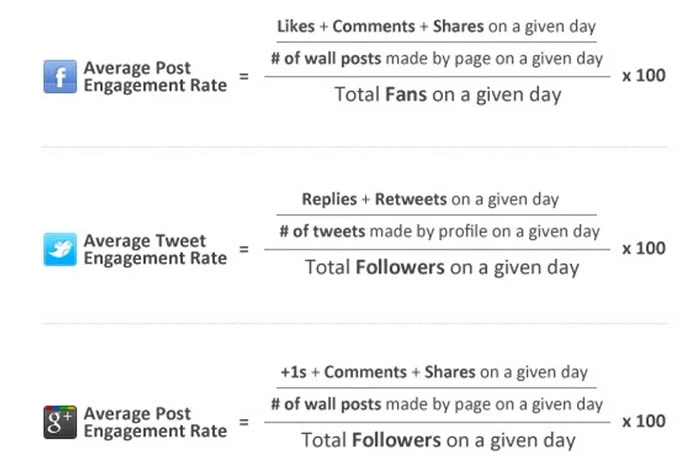
- Social Media Analytics Template
Using the analytic template, you can analyze multiple data types to find out which post is performing the most, which hashtag is generating more traffic, or how many shares your post has got.
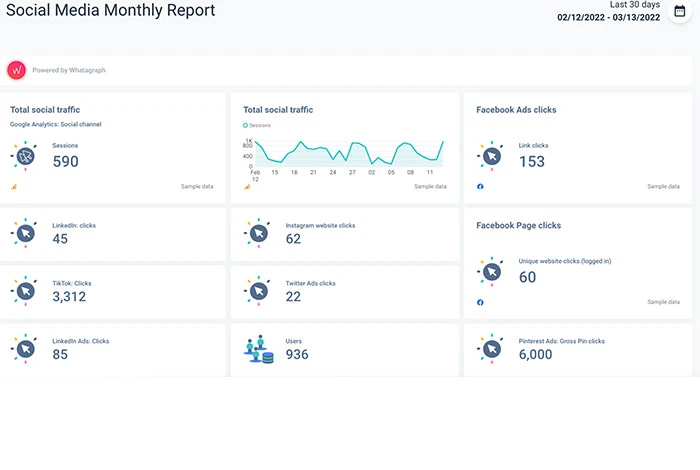
- Benefits of Social Media Marketing
If you run a small business, investing in social media marketing strategy can help you build a credible audience and improve brand visibility. Here’re some of the key benefits of creating social media strategy.
- You can improve brand awareness via posting business specific content and engaging with customers.
- Also, you can optimize social media profiles to improve traffic by adding relevant keywords in your bio.
- Create relevant social media content through appropriate keywords and hashtags that help improve search engine rankings.
- You can gain better insights about your target audience through analytics.
- Social media marketing strategy could help you reach a wider audience by posting content resonating with their interests.
- Communicating with the customers on social media handles directly would help in improving their experience and building credibility.
- Also increase the lead conversion rate as the content posted on any social media platform can direct your visitors to your website.
Conclusion
When it comes to expanding your business presence, social media marketing is no doubt the need of the hour because of its capability to reach out to wider audiences. Social media marketing has undeniably taken over conventional marketing as more and more people are using it, thereby serving as an appropriate medium to promote brand, boost customer engagement, etc.
Related Categories: Social Media Management Tools | Social Media Analytics Tools | Digital Marketing Tools | Content Management Software | WhatsApp Marketing Software
FAQs
What is the most powerful social media marketing strategy?
The most powerful strategy would depend on your social media marketing goals. However, some of the best strategies that worked for businesses include creating different content types to match the audience interests and working with top influences to promote products. You can also upload user-generated content for leveraging the follower's enthusiasm.
2.What is in a social media strategy?
A social media strategy includes all those aspects that help businesses to improve their brand visibility. Some aspects of social media include choosing the right platform, optimizing the platform content, performing social media auditing, and so on.
How social media marketing can empower a marketing strategy?
Social media marketing can empower a business in multiple ways, such as it could in improving the brand awareness and audience engagement, driving traffic to the official website, etc. Moreover, it could also help in generating leads through posting relevant content.
How can social media help marketing strategy?
Social media platforms can help with your marketing strategies in plenty of ways. For example, it could help you boost engagement for the brand, create and manage community, and work as a direct communication channel with your customers.
What are the risks of social media marketing?
Although, social media marketing is a good option to promote your business. However, it is also not free of limitations such as privacy and security issues, mostly rely on Ads, you might get negative feedback that might affect your business image. Moreover, you need to stay constantly active on your social media handles for better engagement.
What are some examples of social media marketing strategies?
Some examples of social media marketing strategies include creating social media contests, collaborating with other brands for promotions, developing valuable content, etc. Further, you can also try creating live videos for better engagement with your customers.
Why is social media strategy important?
An effective social media strategy provides users with the guidance they need to find their ideal audience, engage with them more deeply, and develop credibility for the brand. This would help with better lead conversions, higher ROI and revenue.
What should a social media strategy include?
A social media strategy comprises multiple elements that work together for promoting the brand. For example, it includes all the goals you want to achieve through strategy, doing social media audit, improving social media profiles, creating a content calendar, and so on.
Does social media marketing increase sales?
Yes, social media marketing can help you with boosting your sales by promoting your products and services on various social media platforms through an effective plan. Moreover, businesses can also work with social media influencers to promote their brand and generate revenue.
How has social media affected marketing?
Social media has changed the businesses marketing strategies by providing opportunities to sell their products and services to a wider audience and build credibility for the brand. Further, it lets them communicate directly with the customers, thereby improving customer engagement and experience.
How has social media changed marketing and advertising?
Social media marketing has developed two-way communication between the business and the targeted audience that helps to improve transparency and brand visibility. Moreover, it has provided brands with complete control over the audience via advertisements, thus leading to an increase in sales. Furthermore, through content sharing, the advertisement could reach the target audience more quickly than conventional advertising.
Varsha is an experienced content writer at Techjockey. She has been writing since 2021 and has covered several industries in her writing like fashion, technology, automobile, interior design, etc. Over the span of 1 year, she has written 100+ blogs focusing on security, finance, accounts, inventory, human resources,... Read more




















